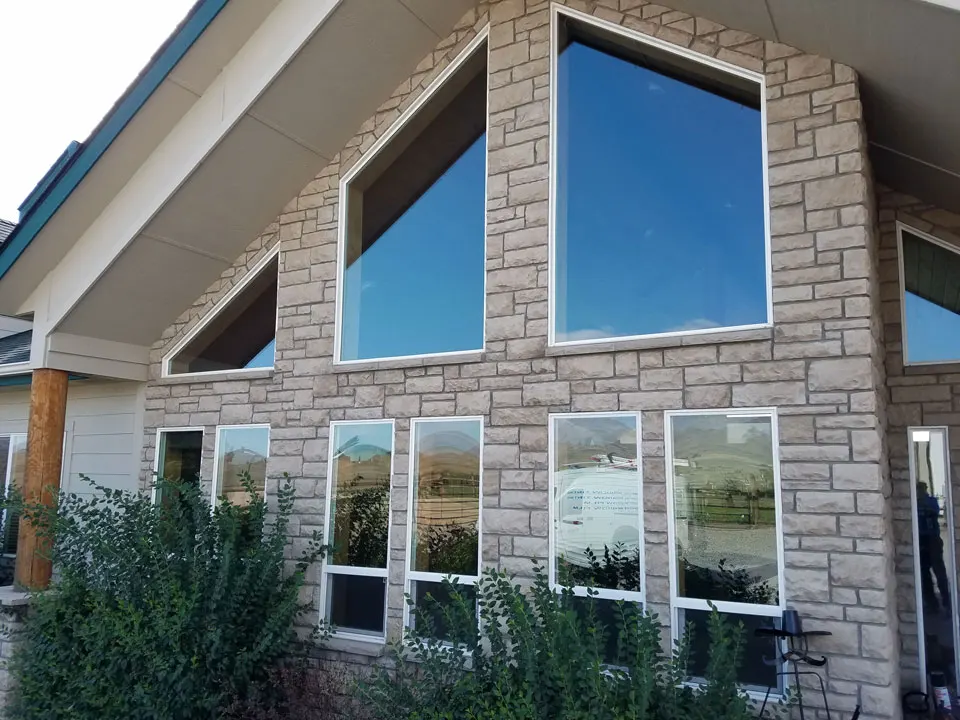Window film is a thin material, usually made of polyester, in multiple layers, and treated with reflective coatings to help homeowners and business owners save energy by retrofitting existing existing windows. Professionally installed window film not only helps property owners save on energy costs, but it also helps reduce the deterioration of interior furnishings, fabrics, and floors by blocking harmful ultraviolet (UV) radiation.
How Is Window Film Made
Window film is generally made of polyester or Polyethylene Terephthalate (PET). PET is in many products and is the same polymer that you find in the manufacturing of water bottles.
There are a number of different window films from a variety of manufacturers to choose from. A typical architectural grade window film is made of multiple thin layers of PET. Some layers are clear while others are dyed or have pigments added to darken or colorize the film. In addition to these layers, another layer is added with metal or ceramic coatings to reflect or absorb energy. Finally, a clear hard coat is added to the film to provide durability and protection against scratching.
Window film is typically installed on the interior side of glass, but some films can be applied on the exterior side under special circumstances.
How Does Window Film Save Energy
Window film will help increase the efficiency of your existing windows by up to 25%. It is estimated that in an uninsulated home, around 35% of heat loss occurs through walls and 25% is lost through your roof. The remaining 40% is lost through doors, windows and your floor.
When window film is properly applied, it decreases energy transfer coming in from the outside. It will both reflect and absorb some of the radiant energy from the sun. Depending on the darkness and the amount of reflectivity you have on your chosen window film, a percentage of the remaining radiant energy will transfer through a window with window film installed.
In a sense, window film is an insulator much like the insulation you have in the walls or attic of your home. In addition to protecting your home from outside energy, window film will also help retain any energy generated by your heating and air conditioning systems. In the summer, window film will block outside heat and any cool air generated by your air conditioner will stay in your property longer versus escaping from your windows.
There is a common misconception that you want radiant heat to enter your home through the windows in the winter months to heat your home. While that may be true to a certain extent, allowing radiant heat to enter the home through the windows in the winter months puts increased wear and tear on your home’s heating system. Once the sun sets, temperatures drop forcing your heating system to work overtime to maintain the level of heat you were experiencing throughout the day, thus increasing your heating bill.
How Does Window Film Reduce Fading
A majority of architectural grade window films on the market will block up to 99% of harmful UV rays that cause damage to flooring, walls, and furniture in homes and offices.
Keep in mind two factors that cause fading:
- UV rays are primarily responsible for fading, but they only account for 40% of the problem. Combined with infrared radiation (IR) or heat at 25% and visible light at another 25%, you have a recipe for fading.
- The remaining 10% of fading is caused by naturally, physically, or chemically occurring factors. This includes vapors and off-gassing, wear and tear, the age of fabrics or woods, and dye fastness.
While no window film can completely block 100% of the UV rays and fully prevent objects from fading naturally, it will slow down the process of fading dramatically thus preserving your property much longer than without window film.
How To Get Window Film Installed at Your Property
If you feel window film is right for you and your property, the next step is to schedule a one on one consultation with a qualified window film installer. Most companies offer free consultations and can provide you with samples of window film for you to take a closer look at. It is advised to always get an on-site consultation with a qualified window film company to make sure the right films are presented to you that meet your specific needs. Remember, not all window film is the same.
Outside the Boise, Idaho area a free resource is available from the International Window Film Association (IWFA) to find an installer that can help you with window film.
For homeowners and business owners in the Boise, Idaho area and surrounding communities, contact Meridian Window Tint.

